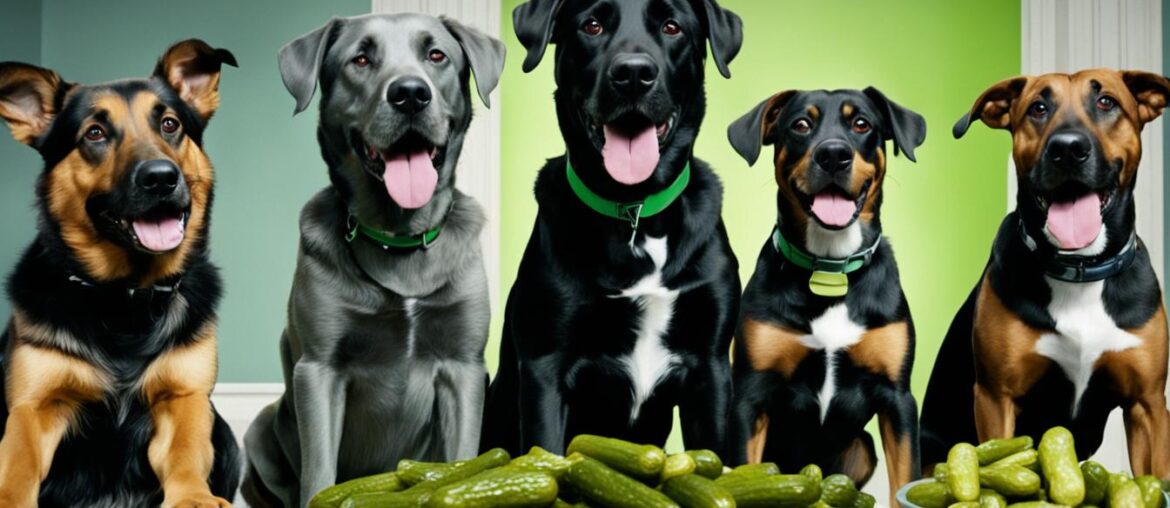As a pet owner, you may be curious about what human foods are safe for your furry friend to enjoy. One common question that arises is whether dogs can eat dill pickles. While it’s important to provide a healthy and balanced diet for your canine companion, there are certain foods that can pose potential risks to their health.
Dogs can eat pickles in some cases, but it is generally advised to avoid feeding them to your four-legged friend. Dill pickles often contain ingredients like onions and garlic, which can be toxic to dogs. These ingredients can cause stomach upset, anemia, and other serious health issues in dogs. Additionally, pickles can be high in sodium, which can be harmful to dogs and lead to salt toxicosis and dehydration.
If you’re considering introducing new foods into your dog’s diet, it’s always best to consult with a veterinarian first. They can provide personalized advice based on your dog’s specific needs and help you make informed decisions about their nutrition.
Key Takeaways:
- Dogs should generally avoid dill pickles due to potential toxic ingredients and high sodium content.
- Onions and garlic in pickles can cause stomach upset and anemia in dogs.
- The high sodium levels in pickles can lead to salt toxicosis and dehydration in dogs.
- Consult with a veterinarian before introducing new foods into your dog’s diet.
- Consider safe alternatives like cucumbers, which offer hydration and nutritional benefits for dogs.
Are Pickles Safe for Dogs to Eat?
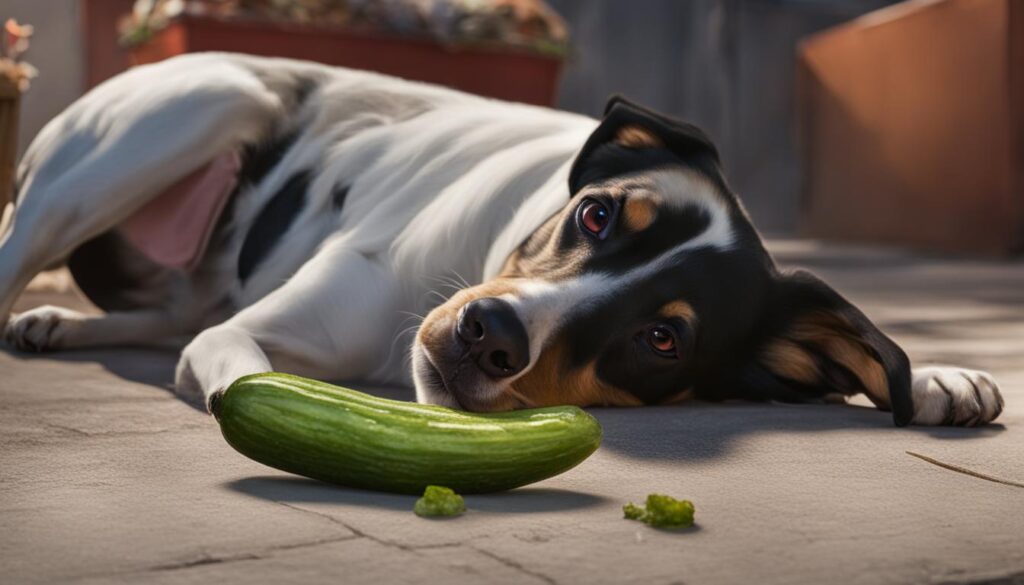
Pickles, a popular condiment made from cucumbers, may be a delicious treat for us humans, but are they safe for our furry friends? The answer is not as clear-cut as you might think. While some pickles may seem harmless, there are risks associated with feeding dogs dill pickles.
One of the main concerns is the presence of ingredients like onions and garlic in pickles. These vegetables belong to the Allium family, which can cause anemia and other serious health issues in dogs. Ingesting pickles containing these ingredients could potentially put your dog’s well-being at risk, leading to potential trips to the veterinarian.
Another consideration is the high sodium content found in pickles. Dogs have much lower tolerance for sodium compared to humans, and excessive sodium intake can lead to salt toxicosis and dehydration. Symptoms of salt toxicosis include excessive thirst, vomiting, diarrhea, tremors, and even seizures. As responsible pet owners, it is crucial for us to prioritize our dogs’ health and well-being by avoiding potentially harmful foods like pickles.
“Feeding pickles to dogs can be risky due to the presence of onions, garlic, and high sodium content. These ingredients can cause serious health issues and compromise a dog’s well-being.”
Instead of pickles, it is recommended to explore safer treat options for your canine companion. There are numerous dog-friendly snacks available in the market that are formulated specifically for dogs. These treats are carefully crafted to provide the right balance of nutrition without any harmful ingredients. Opting for these vet-approved treats ensures that your furry friend can enjoy delicious snacks without the associated risks.
While pickles may be off-limits for dogs, there are other healthy alternatives to consider. In the next section, we’ll explore whether cucumbers, the primary ingredient in pickles, are a safe option for dogs to enjoy.
What Makes Some Pickles Unsafe for Dogs?
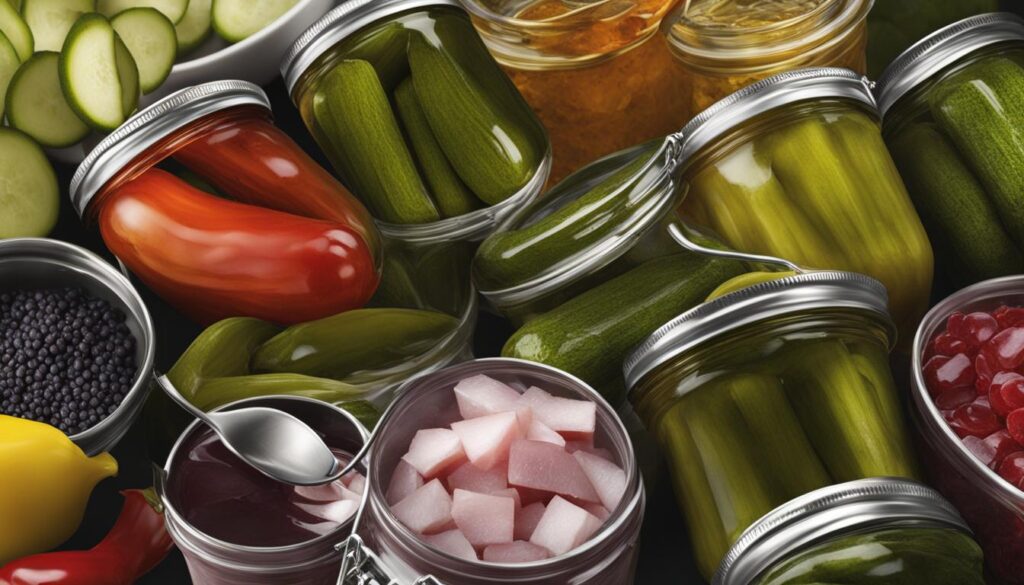
When it comes to pickles, not all types are safe for dogs. Many store-bought pickles contain ingredients that can be harmful to our furry friends. These ingredients include spices, herbs, onions, and garlic, all of which can be toxic to dogs.
Spices and herbs used in pickles can cause stomach upset, discomfort, and even gastrointestinal issues in dogs. Onions and garlic, in particular, are known to be highly toxic to dogs and can lead to anemia and other serious health problems. It’s important to note that even small amounts of these ingredients can have adverse effects on our canine companions.
Furthermore, pickles often have a high sodium content, which can be detrimental to a dog’s health. Dogs are more sensitive to sodium than humans, and consuming foods with excessive sodium can lead to salt toxicosis and dehydration. It’s crucial to be mindful of the sodium levels when considering whether to feed pickles to dogs.
Given these potential risks, it is advisable to carefully read the ingredient list of pickles before offering them to your dog. It is always better to err on the side of caution and avoid feeding pickles to your furry friend altogether. Instead, opt for safe and dog-friendly treat options.
The Dangers of Harmful Ingredients in Pickles
“Onions and garlic are harmful to dogs, and even small amounts can cause serious health issues such as anemia. Additionally, too much sodium from pickles can lead to salt toxicosis and dehydration.”
Remember, your dog’s health and well-being should always be a top priority. By being aware of the potentially harmful ingredients in pickles and making informed choices about their diet, you can help ensure a happy and healthy life for your canine companion.
Potential Health Risks of Feeding Dogs Pickles
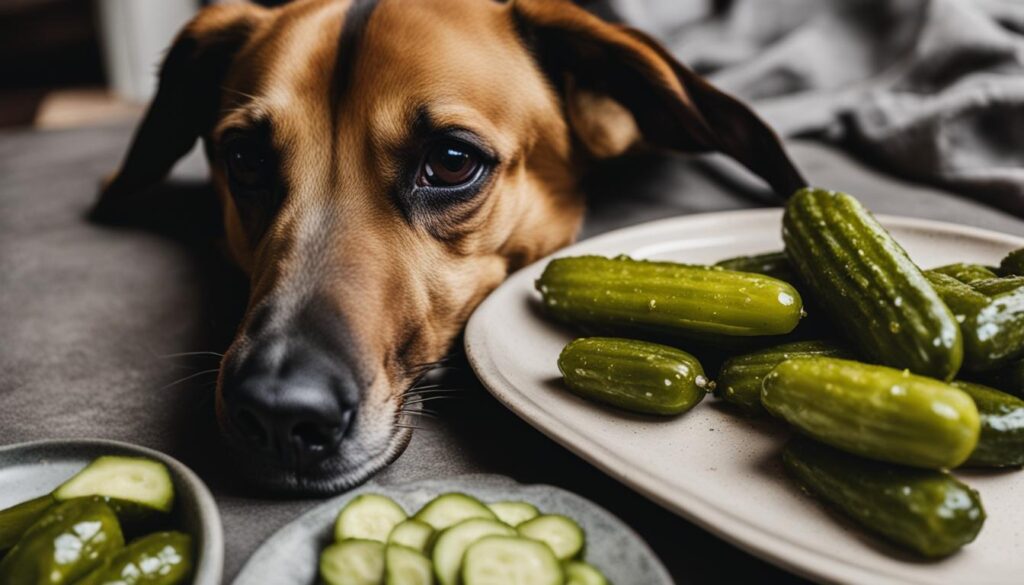
Feeding pickles to dogs can pose several health risks. The ingredients in pickles, such as onions and garlic, can cause anemia and kidney damage in dogs. Additionally, the high sodium content in pickles can exacerbate underlying heart disease and lead to dehydration. Dogs with diabetes, obesity, or dental issues should also avoid pickles due to their sugar content. It is important to prioritize a dog’s overall health and provide them with safe and nutritious treats.
Onions and garlic, both commonly found in pickles, contain compounds that are toxic to dogs. These ingredients can cause oxidative damage to red blood cells, leading to anemia, weakness, and lethargy. In severe cases, ingestion of onions and garlic can result in kidney damage, which can be life-threatening.
The high sodium content in pickles can have adverse effects on a dog’s health. Excessive sodium intake can lead to salt toxicosis, causing symptoms such as vomiting, diarrhea, excessive thirst, and increased urination. It can also lead to dehydration, as the high sodium levels disrupt the body’s fluid balance.
The Dangers of Pickles and Heart Disease in Dogs
Dogs with pre-existing heart conditions are particularly vulnerable to the dangers of pickles. High sodium levels can worsen heart disease symptoms, putting additional strain on the cardiovascular system. It can lead to increased blood pressure, fluid retention, and reduced cardiac function. In severe cases, this can result in heart failure or exacerbation of existing heart conditions.
In addition to heart disease, pickles can also pose risks for dogs with diabetes, obesity, or dental issues. The sugar content in pickles can negatively impact blood sugar levels in diabetic dogs. Dogs that are overweight or obese may be at a higher risk of developing health issues, and the high sodium and sugar content in pickles can contribute to weight gain and further complications. The acidity of pickles can also be harmful to a dog’s dental health, potentially leading to tooth decay and gum disease.
When it comes to treating our furry friends, it is crucial to prioritize their well-being and provide them with safe and nutritious treats. While pickles may be a favorite snack for us humans, they are best left off the menu for dogs. Instead, opt for alternatives that are low in sodium, sugars, and potentially harmful ingredients.
Can Dogs Eat Cucumbers Instead?
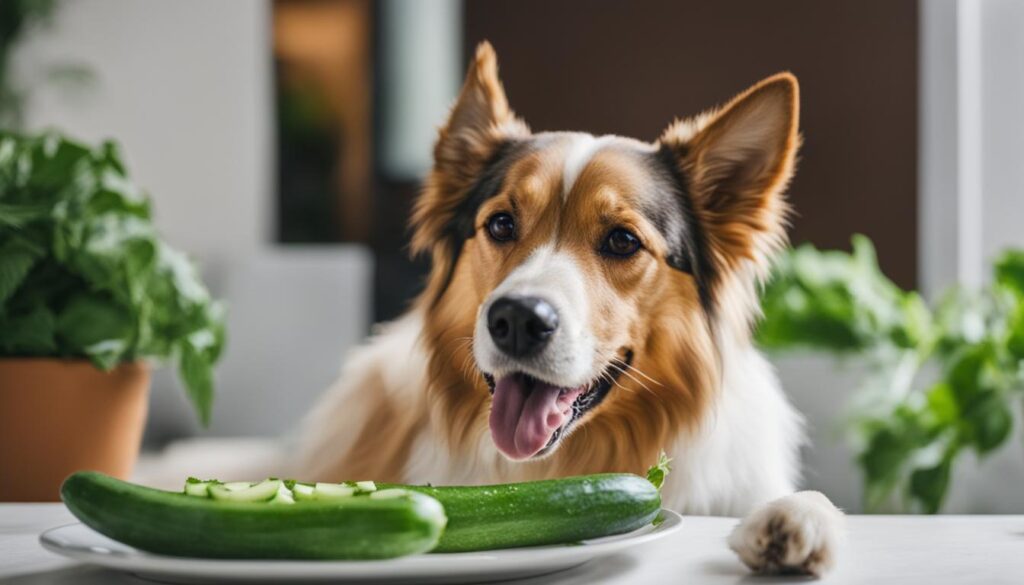
When it comes to finding a safe alternative for dogs, cucumbers are a great option. Not only are they low in calories, but they also offer several nutritional benefits that can support your dog’s health and well-being. Cucumbers are a hydrating vegetable and are packed with essential vitamins and minerals.
To incorporate cucumbers into your dog’s diet, you can slice them into thin pieces and offer them as occasional snacks. You can also incorporate cucumbers into your dog’s regular meals by chopping them into small, digestible pieces. However, it is important to note that dogs should always be introduced to new foods gradually to avoid any gastrointestinal issues.
When feeding cucumbers to your dog, it is crucial to remove the ends and peel the cucumber before serving. This is because cucurbitacin, a compound found in the ends and peel of cucumbers, can potentially be toxic to dogs. By taking these precautions, you can ensure that your dog can safely enjoy the nutritional benefits of cucumbers.
Here is a table highlighting the nutritional value of cucumbers for dogs:
| Nutrient | Amount per 100g |
|---|---|
| Water | 95.2g |
| Calories | 15kcal |
| Protein | 0.7g |
| Fat | 0.1g |
| Carbohydrates | 3.6g |
| Fiber | 0.5g |
| Vitamin K | 16.4mcg |
| Vitamin C | 2.8mg |
| Potassium | 147mg |
| Magnesium | 13mg |
Cucumbers are a nutritious and refreshing treat for dogs, but it is important to remember that they should be given in moderation and not used as a replacement for a balanced diet. As with any new food, it is recommended to consult with your veterinarian before introducing cucumbers into your dog’s diet.
How to Safely Feed Cucumbers to Dogs
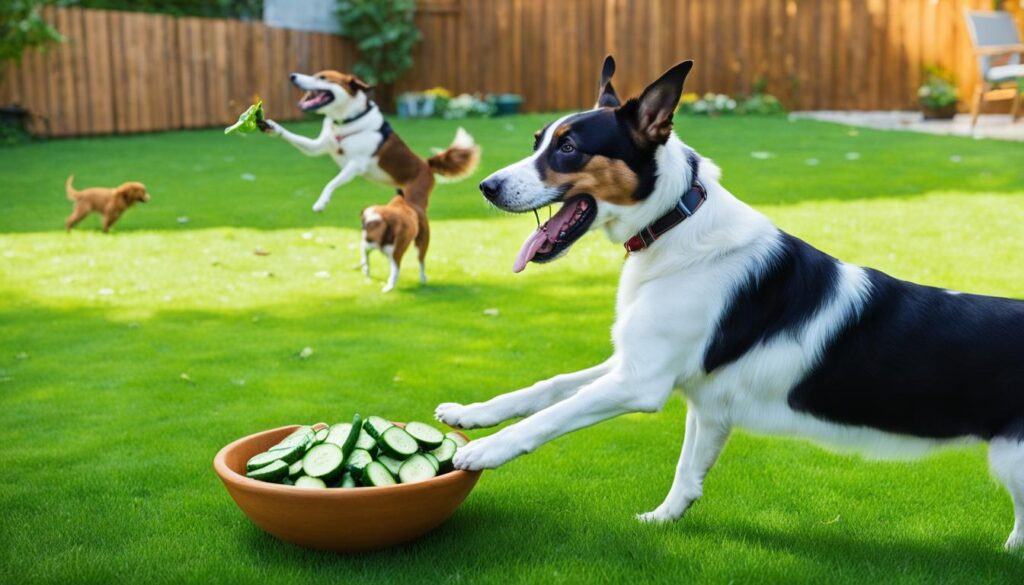
Incorporating cucumbers into a dog’s diet can provide numerous health benefits. To ensure the safe consumption of cucumbers by dogs, it is essential to follow proper feeding guidelines.
Cucumbers should be cut into bite-sized pieces before feeding them to dogs. This helps prevent choking hazards and ensures easier digestion. It is recommended to remove the ends and peel the cucumber to avoid any potential toxicity from cucurbitacin. By cutting cucumbers into appropriate sizes, we can promote safe and enjoyable eating habits for our furry friends.
Cucumber pieces can be added to a dog’s meals as a supplement or offered as a refreshing snack between meals. They provide a crunchy texture that many dogs enjoy. Additionally, cucumbers can be used as a healthy and low-calorie treat during training sessions, making them an ideal choice for positive reinforcement.
When introducing cucumbers to a dog’s diet, it is crucial to start with small amounts. Monitoring the dog for any adverse reactions, such as digestive issues or allergies, is necessary. Every dog is unique, and their tolerance to new foods can vary. By gradually introducing cucumbers and observing their response, we can ensure a positive experience.
| Bite-sized Cucumber Feeding Guide |
|---|
| Cut cucumbers into small, bite-sized pieces. |
| Remove ends and peel to avoid toxicity. |
| Start with small amounts and gradually increase as tolerated. |
| Monitor for any adverse reactions, such as digestive issues or allergies. |
| Use cucumbers as a supplement or snack, not a replacement for balanced meals. |
Before incorporating any new food into a dog’s diet, it is always important to consult with a veterinarian. They can provide personalized advice based on the dog’s specific needs and ensure a balanced and nutritious diet. By following proper feeding practices, we can safely include cucumbers as a part of our dog’s overall wellness regimen.
Benefits of Cucumbers for Dogs
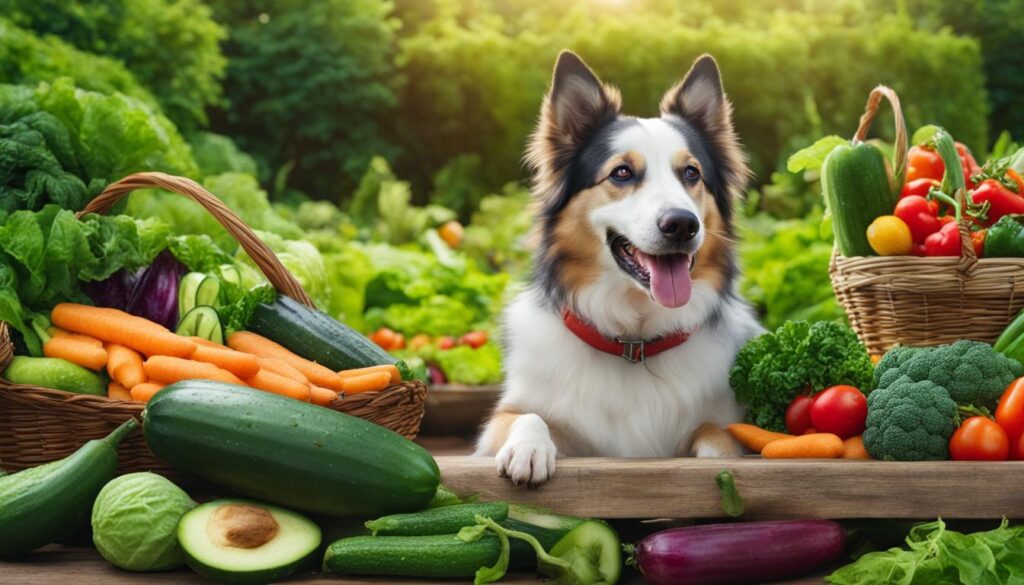
Cucumbers offer several health benefits for dogs. Here are some of the key advantages:
- Hydrating: Cucumbers are mostly water, making them a great way to keep your furry friend hydrated.
- Low in Calories: Cucumbers are low in calories, which makes them a suitable snack option for overweight dogs or those on a weight-loss journey.
- Nutritional Value: Cucumbers are packed with important vitamins and minerals that contribute to your dog’s overall well-being. They contain vitamin A, vitamin K, magnesium, calcium, potassium, and phosphorus, which are all essential for maintaining good health.
- Antioxidants: Cucumbers contain antioxidants that help fight against cell damage and promote better health.
It is important to note that while cucumbers offer these benefits, they should not replace a dog’s regular diet and should only be given in moderation as a snack or supplement.
Detailed Nutritional Value of Cucumbers for Dogs
| Nutrient | Value |
|---|---|
| Water | Approximately 95% of cucumber’s weight is water, making it a hydrating snack. |
| Vitamin A | Essential for healthy vision, growth, and immune system support. |
| Vitamin K | Plays a role in blood clotting and bone health maintenance. |
| Magnesium | Important for muscle and nerve function, as well as energy production. |
| Calcium | Crucial for strong bones and teeth. |
| Potassium | Helps regulate blood pressure and maintain proper heart function. |
| Phosphorus | Plays a vital role in bone and teeth formation, as well as energy metabolism. |
Remember to introduce cucumbers gradually into your dog’s diet and monitor for any adverse reactions. If you have any concerns about your dog’s specific nutritional needs, it is best to consult with a veterinarian.
Precautions When Feeding Cucumbers to Dogs
While cucumbers are generally safe for dogs, there are a few precautions to consider to ensure their well-being and avoid potential risks. Here are some important factors to keep in mind when feeding cucumbers to your furry friend:
- Cut into small pieces: When offering cucumbers to your dog, it’s crucial to cut them into small, bite-sized pieces. This helps prevent choking hazards and ensures easier digestion.
- Remove ends: Prior to serving cucumbers to your dog, make sure to remove the ends. This is important as the ends of cucumbers may contain a slightly higher concentration of cucurbitacin, a compound that can cause digestive upset in dogs.
- Monitor for adverse reactions: Each dog’s digestive system is unique, and some dogs may have sensitivities or allergies to certain foods, including cucumbers. Start by introducing small amounts of cucumbers and carefully monitor your dog for any adverse reactions such as stomach upset or changes in bowel movements.
In addition to these precautions, it is always advisable to consult with a veterinarian before adding any new food to your dog’s diet, including cucumbers. They can provide personalized advice based on your dog’s specific health needs and dietary requirements.
| Precautions When Feeding Cucumbers to Dogs | |
|---|---|
| 1. Cut into small pieces | To avoid choking hazards and aid digestion, cut cucumbers into small, bite-sized pieces. |
| 2. Remove ends | Removing the ends of cucumbers helps reduce the potential risk of toxicity from cucurbitacin. |
| 3. Monitor for adverse reactions | Introduce cucumbers slowly and observe your dog for any adverse reactions, such as stomach upset or changes in bowel movements. |
Why Dogs Should Avoid Pickle Juice
Pickle juice, the liquid used to preserve pickles, should be avoided when it comes to feeding dogs. Although some may find the tangy or briny taste of pickle juice appealing, it is generally not suitable for our canine companions. There are several reasons why dogs should steer clear of pickle juice.
One of the primary concerns is the high salt content commonly found in pickle juice. Dogs have different dietary needs compared to humans, and excessive salt intake can lead to salt toxicosis and dehydration in dogs. This is especially true for small dogs or those with pre-existing health conditions such as kidney issues or heart disease.
While pickles themselves may already be high in sodium, the concentration of salt in pickle juice can be even higher due to the brining process. This concentration can be particularly harmful to dogs, as their bodies are not designed to handle large amounts of salt.
Furthermore, the acidity of pickle juice can potentially upset a dog’s stomach. The vinegary nature of pickle juice may cause digestive discomfort and gastric irritation in some dogs, leading to vomiting or diarrhea.
In conclusion, it’s best to avoid feeding dogs pickle juice. The high salt content and the potential for digestive upset make it an unsuitable choice for our four-legged friends. Instead, provide dogs with fresh water as the main source of hydration and consult a veterinarian for proper dietary guidance.
The Importance of Consulting a Veterinarian
When it comes to ensuring the well-being of our furry companions, consulting a veterinarian is of utmost importance. This is particularly true when it comes to their diet and nutrition. Dogs, just like humans, have unique dietary needs that are influenced by various factors such as age, health condition, activity level, and medical history.
While this article provides vet-approved guidelines, it is crucial to remember that they should serve as a general guide rather than an individualized nutrition plan for your dog. A veterinarian is the best source of personalized advice and recommendations based on your dog’s specific needs.
By consulting a veterinarian, you’ll receive expert guidance on introducing new ingredients or supplements into your dog’s diet. They can help you determine whether certain human foods, like pickles or cucumbers, are safe for your dog to consume and in what quantities. Furthermore, a veterinarian can assess your dog’s overall health and recommend specific nutritional plans tailored to their individual requirements.
“A veterinarian can provide the necessary expertise to ensure your dog receives a balanced and nutritious diet to support their overall well-being.”
Remember that dogs are not one-size-fits-all when it comes to nutrition. What works well for one dog may not be suitable for another. Consulting a veterinarian helps to ensure that your dog’s dietary needs are met and that they receive the optimal nutrition to maintain good health.
So, before introducing any new ingredients or making significant changes to your dog’s diet, reach out to a trusted veterinarian who can provide professional guidance and help you create an individualized nutrition plan tailored to your furry friend’s specific needs.
What to Do If a Dog Eats Pickles
If your dog accidentally eats pickles without permission, it’s natural to feel concerned. However, in most cases, consuming a small amount of pickles is unlikely to cause serious harm. While pickles can be potentially harmful to dogs due to ingredients like onions and garlic, it’s important to assess the situation calmly.
If your dog has eaten pickles and you’re unsure of the potential health risks, it’s recommended to contact a veterinarian for advice and reassurance. A vet can provide guidance based on your dog’s specific situation and advise on any necessary steps to take.
In the event that you suspect your dog may be experiencing an adverse reaction to the pickles or if there is an emergency, it’s crucial to seek immediate veterinary assistance. The ASPCA Poison Control Center can be contacted for expert consultation over the phone.
Expert Insight:
“If your dog ingests pickles without permission, it’s important to assess the situation calmly. While most dogs will likely be unaffected by consuming a small amount of pickles, it’s always best to consult with a veterinarian to ensure the safety and well-being of your furry friend.”
Wrapping Up
In conclusion, it is generally best to avoid feeding pickles to dogs due to the potential health risks associated with certain ingredients and the high sodium content. Onions and garlic, commonly found in pickles, can cause stomach upset, anemia, and other serious health issues in dogs. Additionally, the high sodium levels in pickles can be harmful, leading to salt toxicosis and dehydration.
Instead, a safer alternative for dogs is cucumbers. Cucumbers offer hydration, low calories, and important vitamins and minerals beneficial to a dog’s health. However, it is crucial to introduce cucumbers slowly and monitor for any adverse reactions. It is always recommended to consult with a veterinarian before introducing new foods into a dog’s diet to ensure their overall health and well-being.
Overall, prioritizing a dog’s health and providing them with safe and nutritious treats is essential. While pickles may be tempting, it is best to opt for healthier options like cucumbers, always keeping in mind a dog’s specific dietary needs and seeking professional advice when necessary.
FAQ
Can dogs eat dill pickles?
Dogs can eat pickles in some cases, but it is generally advised to avoid them due to potential ingredients like onions and garlic that can be toxic to dogs. Pickles may also contain high levels of sodium, which can be harmful to dogs. It is important to consult with a veterinarian before introducing new foods into a dog’s diet.
Are pickles safe for dogs to eat?
Pickles can be harmful to dogs, especially those that contain ingredients like onions and garlic. These ingredients can cause upset stomach, anemia, and other serious health issues in dogs. Additionally, the high sodium content in pickles can be dangerous for dogs, leading to salt toxicosis and dehydration. It is best to avoid feeding pickles to dogs and opt for safer treat options.
What makes some pickles unsafe for dogs?
Many store-bought pickles contain spices, herbs, and ingredients like onions and garlic that are toxic to dogs. These ingredients can cause stomach upset, anemia, and other health problems. Pickles may also contain high levels of sodium, which can be detrimental to a dog’s health. It is important to carefully read the ingredient list of pickles and avoid feeding them to dogs.
What are the potential health risks of feeding dogs pickles?
Feeding pickles to dogs can pose several health risks. The ingredients in pickles, such as onions and garlic, can cause anemia and kidney damage in dogs. The high sodium content in pickles can also exacerbate underlying heart disease and lead to dehydration. Dogs with diabetes, obesity, or dental issues should also avoid pickles due to their sugar content. It is important to prioritize a dog’s overall health and provide them with safe and nutritious treats.
Can dogs eat cucumbers instead?
Cucumbers are a safer alternative to pickles for dogs. They are low in calories, hydrating, and contain vitamins and minerals beneficial to dogs’ health. Cucumbers can be sliced into thin pieces and offered as occasional snacks or incorporated into a dog’s regular meals. However, it is important to remove the ends and peel to avoid potential toxicity from cucurbitacin. Dogs should always be introduced to new foods gradually and monitored for any adverse reactions.
How to safely feed cucumbers to dogs?
Cucumbers should be cut into bite-sized pieces before feeding them to dogs. This helps prevent choking hazards and ensures easier digestion. Cucumber pieces can be added to a dog’s meals as a supplement or offered as a snack between meals. They can also be used as rewards during training sessions. It is important to start with small amounts of cucumbers and monitor the dog for any digestive issues. If any adverse reactions occur, it is recommended to consult a veterinarian.
What are the benefits of cucumbers for dogs?
Cucumbers offer several health benefits for dogs. They are hydrating, low in calories, and contain important vitamins and minerals such as vitamin A, vitamin K, magnesium, calcium, potassium, and phosphorus. Cucumbers also provide antioxidants that help fight cell damage. They are a suitable snack option for overweight dogs or those on a weight-loss journey. However, cucumbers should not replace a dog’s regular diet and should only be given in moderation.
What precautions should be taken when feeding cucumbers to dogs?
While cucumbers are generally safe for dogs, there are a few precautions to consider. Cucumbers should be cut into small pieces to avoid choking hazards, and the ends should be removed to prevent potential toxicity from cucurbitacin. Cucumber seeds are not toxic but may cause an upset stomach in some dogs. It is important to introduce cucumbers slowly and monitor for any adverse reactions. If any digestive issues or other concerns arise, it is best to consult a veterinarian.
Why should dogs avoid pickle juice?
Pickle juice, which is the liquid used to preserve pickles, should be avoided for dogs. It often contains high levels of salt and can lead to salt toxicosis and dehydration in dogs. The tangy or briny taste of pickle juice is not appealing to most dogs, and the high salt content can be harmful to their health. It is best to stick to fresh water as the main source of hydration for dogs.
Why is it important to consult a veterinarian?
Before introducing any new ingredients or supplements to a dog’s diet, especially human food, it is crucial to consult with a veterinarian. Every dog is unique and may have specific dietary needs based on factors such as age, health, activity level, and medical history. Guidelines provided in this article are vet-approved but should be used as a general guide rather than an individual nutrition plan. A veterinarian can provide personalized advice and recommendations for a dog’s diet.
What should I do if my dog eats pickles?
If a dog accidentally eats pickles without permission, it is important not to panic. In most cases, a small amount of pickles is unlikely to cause serious harm. However, it is recommended to contact a veterinarian for advice and reassurance. They can provide guidance on any potential health risks and suggest any necessary steps to take. If immediate assistance is needed, the ASPCA Poison Control Center can be contacted for expert consultation over the phone.
Can I conclude that dogs should not eat pickles?
While some pickles may contain ingredients that are safe for dogs, it is generally advised to avoid feeding pickles to dogs due to potential health risks associated with ingredients like onions, garlic, and high sodium content. Cucumbers can be a safer alternative, offering hydration, low calories, and nutritional benefits for dogs. However, it is important to introduce cucumbers slowly and monitor for any adverse reactions. Consulting with a veterinarian is crucial for ensuring a dog’s overall health and providing appropriate dietary guidance.


